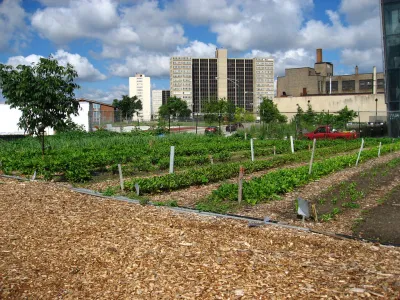Community-supported agriculture (CSA) programs originally let local buyers support local growers. But with a rise in subscription-based "food box" clubs, it's getting harder to say what a real CSA looks like.

There's always been some overlap between alternative and local agriculture, and community-supported agriculture has been a way to operationalize small and local growers for decades. But a new wave of digital entrepreneurs is crowding the space with subscription-based "food box" services, not all of them local.
Samantha Melamed writes, "Now, though, small farmers [...] are finding themselves in competition with a slew of subscription-based food vendors, from meal-kit boxes like Blue Apron to mail-order produce boxes like Farmbox Direct to aggregators who mix local produce with stuff from Florida or Mexico."
Traditional CSA farmers like Emma Cunniff take issue when these services brand themselves as CSAs. "'I've noticed so many cooperative-buying clubs; they're not CSAs, but they have adopted that title because it's really hot and sexy right now. Some of their farms are up to 250 miles away. That's not local agriculture.'"
Nevertheless, the CSA business model has proven useful to entrepreneurs who finance and source from small farming operations. Whether or not they call themselves CSAs—and perhaps they shouldn't—food box subscriptions and similar services have attracted clientele.
FULL STORY: New CSAs may be 'hot and sexy,' but they're not really CSAs

Analysis: Cybertruck Fatality Rate Far Exceeds That of Ford Pinto
The Tesla Cybertruck was recalled seven times last year.

National Parks Layoffs Will Cause Communities to Lose Billions
Thousands of essential park workers were laid off this week, just before the busy spring break season.

Retro-silient?: America’s First “Eco-burb,” The Woodlands Turns 50
A master-planned community north of Houston offers lessons on green infrastructure and resilient design, but falls short of its founder’s lofty affordability and walkability goals.

Test News Post 1
This is a summary

Analysis: Cybertruck Fatality Rate Far Exceeds That of Ford Pinto
The Tesla Cybertruck was recalled seven times last year.

Test News Headline 46
Test for the image on the front page.
Urban Design for Planners 1: Software Tools
This six-course series explores essential urban design concepts using open source software and equips planners with the tools they need to participate fully in the urban design process.
Planning for Universal Design
Learn the tools for implementing Universal Design in planning regulations.
EMC Planning Group, Inc.
Planetizen
Planetizen
Mpact (formerly Rail~Volution)
Great Falls Development Authority, Inc.
HUDs Office of Policy Development and Research
NYU Wagner Graduate School of Public Service


























